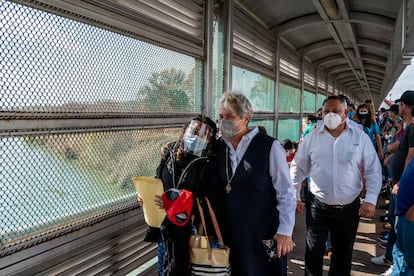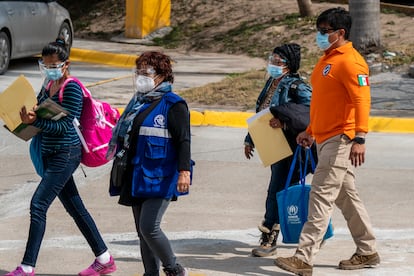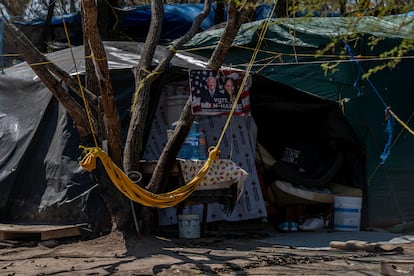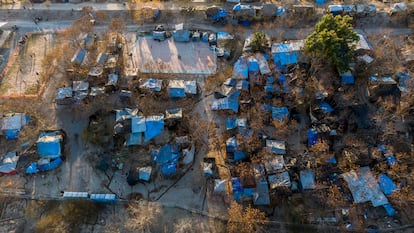Bringing an end to the Matamoros refugee camp, a symbol of Trump’s hardline immigration policy
The Joe Biden Administration has already begun transferring migrants to the US as he seeks to terminate a program that left 71,000 asylum seekers stranded in northern Mexico


“Thank God I’m here.” That was the first thing Onelia Alonso, a 61-year-old political exile from Cuba, said last Thursday when she arrived to rounds of applause at the bus station in Brownsville, Texas. Her arrival, together with 26 other asylum seekers, signaled the beginning of the end of the migrant camp in Matamoros, in northern Mexico. At this camp, erected just meters away from the US border on the other side of the Rio Grande, migrants were forced to wait until a judge was able to hear their request for asylum. It was a product of the hardline immigration policy of former US president Donald Trump, which President Joe Biden has promised to end as soon as possible.
Alonso fled Cuba for Trinidad and Tobago at the end of 2017 after being threatened by the Cuban government for belonging to the opposition group ‘Damas de Blanco’, which was founded by wives and other female relatives of jailed dissidents. She traveled across dozens of countries, crossing the dangerous Darién Gap, a remote, roadless swath of jungle on the border of Panama and Colombia, before reaching Mexico. But she was unable to go any further due to the Migrant Protection Protocols (MPP), a US program – often referred to as “Remain in Mexico” – created by the Trump administration which forced asylum seekers at the southern border to remain in Mexico until their court hearing. More than 71,000 asylum seekers were sent back to Mexico under the MPP. Last week, the Biden administration began the process of receiving the more than 25,000 asylum seekers whose cases remain open, meaning they can await a judge’s decision while on US soil.

Alongside Alonso on the bus to Texas was a trans woman from El Salvador who hoped that in the US she would be able to live as herself without fear of violence; a Guatemalan farm worker on crutches who had fled the country after being attacked in a conflict over land; several families and at least one pregnant woman. They had all been living for months in the Matamoros migrant camp. The transfer across the border was fast and involved an antigen test to prevent migrants with the coronavirus from entering the US. In the next few days, more refugees with open cases will be transferred until the camp is no more, a process that could take between eight and 10 days.
“It’s the end of a cycle, a stage that never should have happened,” says Juan Sierra, the head of the charity group Casa del Migrante in Matamoros. Although he has been helping people in transit to the US for years, he says he never thought he would live to see a camp on such a large scale – nearly 2,000 people were living there before the coronavirus pandemic. As of Wednesday, that number had fallen to 750, according to a recent count. For those still at the camp, there are mixed feelings: hope and happiness for those who will be transferred across the border, and sadness for those who have also been waiting for months, but will not cross either because their asylum requests have been denied or they have not yet had the chance to file their request.
Erasing Trump’s immigration legacy
Since the MPP was implemented in the summer of 2019, migrant families in Matamoros have gone from sleeping on the street to living in a real neighborhood, with tents donated by non-government organizations and churches. After the tents came portable toilets, showers, water purification plants, kitchens, distribution points for donations, makeshift schools and workshops for children, churches and even a field hospital, which was set up in response to the pandemic.
Despite this support, migrants at Matamoros have suffered a wide range of adversities: from extreme weather to the coronavirus crisis, which created an even deeper limbo when the US decided to close its border in March 2020 and stopped accepting MPP asylum requests. Making matters worse was organized crime. Although no one dares to talk about the problem aloud, everyone at the camp knows that La Maña, the criminal group that controls this area of Matamoros, has a deep influence there. Violent attacks, extortion and rape have been recorded at the camp, according to the migrants, who continue to live with the legacy of trauma of the MPP.

“Throughout this time, we have known many people who have been traumatized and who have had psychological problems,” says Yamalí Flores, a 35-year-old asylum seeker from Honduras, who was sent back to Mexico with her husband and three children in August 2019. “I was going to a psychologist because I couldn’t handle it and my eldest son wasn’t eating and was just sleeping. He told me that he didn’t want to be here anymore,” says Flores. What was most difficult, she says, was protecting her three children, aged 15, 10 and eight, who have not gone to school for nearly two years, and creating a sense of normalcy for them. “As a mom, I always feel in tune with the three of them and I tell them we have to keep our faith and hope, knowing that this will end soon,” she says.
Biden has made ending the refugee camp in Matamoros, a symbol of one of Trump’s hardline immigration policies, a priority. But while the door has opened to this group, his administration says that the border will remain closed to new asylum cases. In the meantime, migrants like Yamalí Flores are packing up their belongings and saying goodbye to people in Matamoros, who have become like family. Her children have given away their bicycles and toys to other children that will remain behind. “I know this is going to mark our lives forever and that we will value our lives more,” says Flores, who will travel with friends to San Francisco once they arrive in the US. “I know that every time I wake up in the morning, I am always going to remember that I am not sleeping in a tent.”

English version by Melissa Kitson.
Tu suscripción se está usando en otro dispositivo
¿Quieres añadir otro usuario a tu suscripción?
Si continúas leyendo en este dispositivo, no se podrá leer en el otro.
FlechaTu suscripción se está usando en otro dispositivo y solo puedes acceder a EL PAÍS desde un dispositivo a la vez.
Si quieres compartir tu cuenta, cambia tu suscripción a la modalidad Premium, así podrás añadir otro usuario. Cada uno accederá con su propia cuenta de email, lo que os permitirá personalizar vuestra experiencia en EL PAÍS.
¿Tienes una suscripción de empresa? Accede aquí para contratar más cuentas.
En el caso de no saber quién está usando tu cuenta, te recomendamos cambiar tu contraseña aquí.
Si decides continuar compartiendo tu cuenta, este mensaje se mostrará en tu dispositivo y en el de la otra persona que está usando tu cuenta de forma indefinida, afectando a tu experiencia de lectura. Puedes consultar aquí los términos y condiciones de la suscripción digital.








































